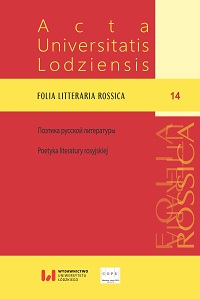Генрих Сапгир: «…детское мышление гораздо более сродни поэтическому»
Genrikh Sapgir: “…Children’s Thinking is Much Like Poetry”
Author(s): Elena Balashova, Igorʹ KargašinSubject(s): Literary Texts, Poetry, Russian Literature
Published by: Wydawnictwo Uniwersytetu Łódzkiego
Keywords: Genrikh Sapgir; Deti v sadu; half-word; lyrical subject; author
Summary/Abstract: The article dwells on the specific character of subjectivity in the poems by Genrikh Sapgir. The features of the lyrical subject’s speech and thinking are discussed on basis of the book Deti v sadu [Children in the Garden]. As the analysis shows, the author’s strategy in this poetic volume is an artistic reconstruction of an adult’s attempt to enter the world of a child’s consciousness. It turns out that texts composed of “half-words” provide clues enough for well- -defined and adequate interpretations. Among the author’s main methods and “signals” that guide the reader, one should mention the context of an utterance (provided by a line or by a poem as a whole) and the operation of language regularities. The poems present a certain poetic experiment, the essence of which is to show the ability of speech to convey meaning accurately even when a significant proportion of lexical units is missing – due to the systemic character of language itself. The result is an attempt of an adult to get into the world of a child’s consciousness, to show this world through “the child’s own mentality”. Moreover, Sapgir’s “experiment” has methodological importance. In the volume Deti v sadu, the poet corroborates the claim made by Aleksandr Skaftymov in his absentee dispute with Aleksandr Potebnya: the subjectivity of a reader’s perception notwithstanding, it is the author that guides the reader. As is worth pointing out, Sapgir may have had yet another reason for resorting to the “half- -words’ poetics”. As is well known, Viktor Krivulin has suggested that as a children’s poet Genrikh Sapgir was a true professional, while in his adult poetics the professionalism sometimes handicapped him. On the one hand then, dealing with the “child’s vision” is one of the ways to avoid “adult professionalism”. On the other hand, such poetics entirely corresponds with Sapgir’s type of creativity – his constant search for new writing methods and new forms of poetic language.
Journal: Acta Universitatis Lodziensis. Folia Litteraria Rossica
- Issue Year: 2021
- Issue No: 14
- Page Range: 181-189
- Page Count: 9
- Language: Russian

